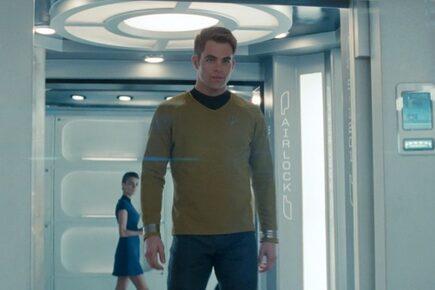
by Dave "The Conduit" Davis
It’s a tricky line to walk, making a summer tentpole movie based on a property that millions of people have memorized, but at the same time keeping it open to those who don’t have an encyclopedic knowledge of that property. Can a fine time be had by all? Or will it be a case of alienating/anger-fretting?
J.J. Abrams managed to successfully walk that line in 2009’s Star Trek reboot, which somehow managed to work past all expectations, and since that film worked, the new Star Trek Into Darkness had a much easier path. We’ve already been introduced to this new timeline (and that was a stroke of genius, allowing Abrams to play in the Star Trek universe without being beholding to 40+ years of continuity). Our expectations are set to the point where we can appreciate this film on its on merits, without that fanboy inner voice saying “That didn’t happen that way! What about….” Sure it happened that way; it was in the other timeline that we’re more familiar with. Abrams can take bits and pieces from the established Star Trek universe (which he does with abandon here), but put them together in a new way that we’ve not seen before.
The film opens a few months (whatever that is in stardates) after the events of the previous film. James T. Kirk (Chris Pine) is in the U.S.S. Enterprise’s center chair, with friend(?) Spock (Zachary Quinto) at his side. Immediately, the film asks the question that I’ve had since the end of the last film: Is Kirk experienced enough to be in command of a starship? Wasn’t his career path streamlined a little too much? He sat down in that seat way too quickly (and, at the risk of contracting myself, in the previous time line, Kirk was young to lead, but he was still 10 or so years into his career before getting command; this film’s Kirk was about three weeks out of the academy). Turns out that, yes, while he has the skills and the “right stuff” to lead, the rough edges are showing, and he’s got some seasoning coming his way.
I have to confess that I was a little apprehensive when I saw that the film was written by Roberto Orci and Alex Kurtzman (along with longtime Abrams cohort Damon Lindelof). Orci and Kurtzman have given us the previous Star Trek film, which is good, but they also gave us all the Transformers films, which, for my money, are as entertaining as throwing silverware into the clothes dryer and watching while Shia LeBeouf stammers “nononononono” in your ear loudly. Fortunately, we’ve got the good Orci/Kurtzman here.
Okay, slight spoiler alert ahead, but it’s nothing that won’t be apparent if you glance at the film’s IMDB.com page. You’ve been warned….
Enter Khan (Benedict Cumberbatch) into this new world. He’s not the same bad guy Ricardo Montalban played. It’s the same character, but it’s a different take; different to the point that Cumberbatch isn’t coming close to playing Montalban. And that’s okay. He has his own motivations, and plot points started in the previous film (which have led to the differences in this timeline from the previous series) play out in a way that we can understand, even if we don’t agree.
The original series was a product of its time. The Cold War was in full swing, and the series reflected that reality. This film is no different in reflecting the post-911 world we find ourselves in, with the threat of terrorism being expressed early on (which seems to be a theme this summer; Iron Man 3 also played into this mindset).
As you’d expect from a summer blockbuster, there’s action aplenty, and the Enterprise gets the crap beat out of it. Explosions, explosive decompressions and plenty of phasering are to be had. There also, however, plenty of moments for explorations of these characters that we almost know. We get to see how they are alike from what we’re familiar with, and how they are different and new. There’s humor that comes from actors playing fully realized characters, and that’s most welcome.
All that being said, there are some moments where card-carrying Star Trek fans (and I count myself in that number; if there was a card, I’d carry it) are just going to have to bite their tongues just a bit. The geometry of the new Enterprise still baffles me (engineering looks like a huge multi-story steam factory, and there’s a section of the ship that looks like the mezzanine of a luxury hotel, which doesn’t seem a good use of limited space), and I still don’t get (or buy) the “universal transporter” plot element.
But, y’know, it’s not a perfect world, and we hardcore fans are getting more than we’re sacrificing. After the Star Trek: Enterprise television show was cancelled, a nearly two-decade string of the franchise came to an end, and it looked like all the life might have been sucked out through the Great Airlock. The Star Trek universe was getting stale, and was showing its age. It’s nice to have an element of that world that feels new again.
By the way, if you think you’ve been spoiled by the trailer, you haven’t. Trailer’s showing all the plot points is a bone of contention of mine, and this film’s trailers are brilliant. They don’t cheat — all the footage is in the film — but they completely subvert what you’re expecting. You’ll see what I mean in the first five minutes.
(For more from Dave, plus the great podcast he co-hosts, go to: http://toweroftechnobabble.com/ )
![]()

